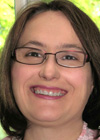
Jennifer Diemart
Jennifer Diemart is the director of speech pathology (SLP) for Hi Desert Physical Rehabilitation Group Inc., a private group offering physical, occupational and speech therapy services to the communities in Twentynine Palms and Yucca Valley, as well as the nearby Marine Corps base, all at the edge of California’s Mojave Desert.
A 2006 graduate of Wichita State University, she credits her accomplishments to the education she received in WSU’s speech-language pathology program.
“I think it’s the best career in the universe,” Diemart said. “I’m very passionate about my profession.”
The road to success, however, was not an easy one.
Diemart grew up in Wichita and discovered the profession of speech therapists early, through a friend who also is an alumna of Wichita State’s SLP program. In fact, Diemart worked as a speech pathology assistant in the local public school systems before and during her time at WSU. She began her college career studying early childhood education, but quickly decided to take her friend’s advice and switch programs.
Diemart met the challenge of graduate school as a working mother of four, but with the help of her mentors in the SLP program, she built on her experience as a Shocker to achieve success and satisfaction.
One of those mentors was professor Barbara Hodson, who says Diemart was an excellent student and clinician who helped her classmates and clients to excel.
“Jennifer’s passion for this profession is extraordinary,” Hodson said. “She already is in a position of recognition, a young leader in our national organization. The fact that she packed up children and moved to California took a lot of strength – and now she is extremely successful in a private practice.”
“I love Dr. Hodson,” Diemart said about her former mentor, now a colleague she occasionally sees at professional conferences. “She brings tremendous knowledge to WSU’s program, particularly in her areas of research. She holds students to a very high standard, and that really helps with the high ethical and knowledge-based professional certifications.”
Flexibility for nontraditional students
Diemart chose WSU because of its flexibility for nontraditional students, and was drawn to the SLP program because the faculty seemed genuinely driven to see their students succeed.
“They were all great,” she said. “Brian Ray, Tony DiLollo, Harold Edwards, who has passed away, Julie Sherz, Trisha Self – they really stand out for me, personally. They were very helpful in helping me get my degree.”
Since graduating, Diemart has taken opportunities to continue developing her professional skills. She has clinical experience in fluency disorders, autism spectrum disorders, phonology/speech sound, early language development, stroke rehabilitation, genetic disorders and syndromes and more.
“The best part of my job,” Diemart said, “is that it doesn’t feel like a job. I’m rewarded every single day I go in to work. It’s never the same thing twice. People always surprise me and I’m always challenged. It’s very rewarding.”
The hardest part of her job, she says, is that you can’t help everybody.
“We don’t have all the answers,” she said, “and especially in my region, resources are limited.”
Diemart’s advice to anyone interested in her profession?
“Shadow a speech pathologist,” she said, “even if you’re in high school. See if you like what they’re doing; picture yourself doing that. Talk to them and learn about what they do.
“SLP is an excellent career choice. It’s an amazing opportunity that covers such a broad spectrum. There’s so much specialization to be found and so many options. I’m actually happy to go into work every day, and that’s a wonderful feeling.”

